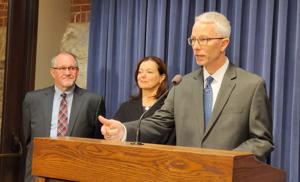(The Center Square) – Illinois cities are looking for state lawmakers to address local public safety pension costs and for the state to return their share of income tax revenue, among other proposals.
The Illinois General Assembly is in session through mid-May. The Illinois Municipal League released its “Moving Cities Forward” legislative agenda Thursday. The plan examines problems and offers solutions for the General Assembly to approve to “ensure that municipal budgets are balanced, and critical services are provided.”
The plan aims to restore to cities the full 10% of funding through the Local Government Distributive Fund, which comes from state income taxes imposed on individuals and businesses across Illinois. As of 2022, the payback to local governments was just 6.16%.
State Sen. Don DeWitte R-St. Charles, said the extra funds could be vital for local municipalities.
“Several years back, an agreement was made that local governments would have 10% of the collected LGDF money returned to them, but in recent years the state of Illinois has been shortchanging communities and sending them lesser amounts,” DeWitte said. “When the Governor sweeps those funds, he places an additional financial strain on local communities, and the ultimate burden falls on property taxpayers.”
IML Executive Director Brad Cole said restoring the full LGDF will go a long way to help alleviate burdens on taxpayer-funded municipal budgets.
“If you want real pension reform, if you want real property tax reform, fund LGDF,” Cole said.
IML President Catherine Adduci, village president of River Forest, offered insight into their pension reform plan.
“Another critical issue is to further reform the downstate public safety pension funds,” Adduci said. “Specifically, by extending the scheduled date these pensions must be funded.”
Adduci advocates for extending the downstate public safety pension system ramp to fund pensions by at least 90% from 2040 to at least 2050 to lessen the financial burden on taxpayers.
“This would provide immediate relief to our communities and taxpayers who continue to face skyrocketing pension payments,” Adduci said.
According to Illinois Department of Insurance data, nearly $14 billion in unfunded liability was owed to local downstate public safety pension plans through 2020.
Another IML agenda item deals with the mandate for police-worn body cameras. Illinois law enforcement officers are required to wear body cameras while on duty. Data from body cam footage goes to different holders for different jurisdictions. According to Cole, the IML plan would consolidate the system to save money for local governments.
“We are looking to create an economy of scale that is going to save money for the local taxpayer,” Cole said. “In the absence of that, what you’ll have is 102 county sheriffs that each have their own [footage] storage contract, and you’ll have upwards of 1,295 municipalities that each have their own storage contract.”
Cole suggests unifying the data collection system like other Illinois services have as an option for municipalities to utilize.
“The current process where Central Management Services buys a master contract for road salt and every municipality says by the first of April, ‘we need 100 tons,’ they pay for it and they get that,” Cole said. “The state has one contract that goes through the procurement process and saves everyone money. That’s what we need for the data storage with the officer-worn body cameras.”
The bills the IML revealed as part of their agenda are as follows: Restoration of Local Government Distributive Fund revenues, reamortization of downstate public safety pension funds, authority to fulfil public notice mandates electronically, authority to conduct remote meetings, and an option to consolidate storage of officer-worn body camera footage statewide.







